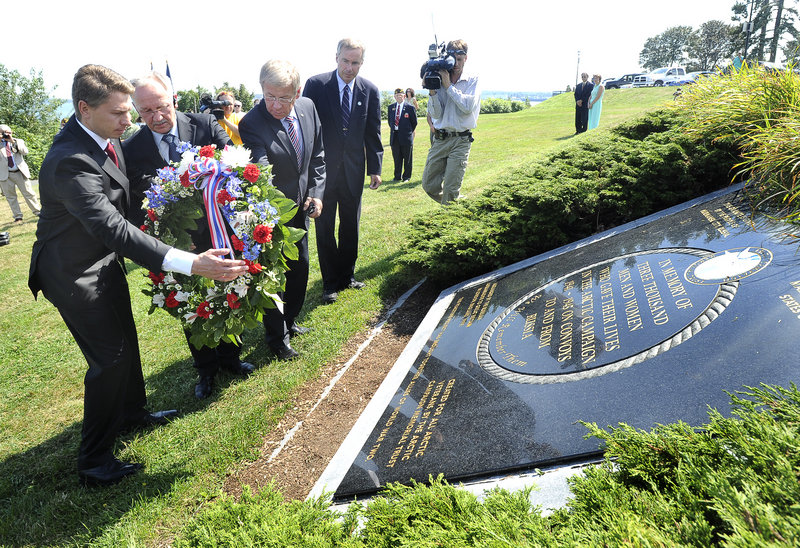PORTLAND – Seventy years ago this month, Portland Harbor was filled with civilian supply ships and warships, preparing to join convoys headed to the Arctic Ocean.
The mission was one of the most dangerous of World War II.
If the ships survived round-the-clock attacks by German U-boats and bombers, they still had to make it through rough seas, fog, and ice that would form as soon as it was chipped away.
For the next four years, until the end of the war in 1945, the Arctic convoys played a critical role, providing food, weapons and other supplies to the Soviets to aid their fight against Nazi Germany.
Of the ships that sailed from Portland, dozens were sunk. About 3,000 military personnel and merchant mariners were killed.
On Thursday, visiting officials from the Russian port city of Archangel joined representatives of the city of Portland and Maine’s military community to honor those sacrifices and acknowledge the continuing bonds between the regions.
They laid a wreath at the Arctic Convoy Memorial plaque on the city’s Eastern Promenade.
“My mother would tell us how they would wait for the convoys to arrive, both from Great Britain and the United States, bringing us supplies and food,” said Stanislav Vtory, speaking to the crowd with help from an interpreter.
“The people of Archangel and the people of Russia have not forgotten how important this aid was,” he said, noting that his father was injured in the war.
Vtory, Andrey Bralnin and Sergey Emmanuilov are members of the Archangel regional legislature, the Duma.
Gov. Paul LePage invited the delegates for a weeklong visit, which will include trips to the State House and the University of Maine, and business tours in Portland and Waterville.
Based largely on the World War II connections, Portland and Archangel formally became sister cities in 1988. Kotlas, a Russian city near Archangel, is sister cities with Waterville.
Mainers have gone to the Archangel region, and vice versa, for cultural, athletic, educational, medical and political exchanges during the past two decades.
Portland was the command center of the U.S. Navy’s North Atlantic fleet during World War II. The harbor was a staging area for the convoys that sailed to Scotland and Iceland and then around German-controlled Norway to the Soviet ports of Murmansk and Archangel.
“The three times I’ve been over there, you can’t turn around without seeing a memorial” to the sacrifices of Russians and Americans during World War II, said Ed Suslovic, a Portland city councilor. He hopes families in Maine will educate the next generation about the history of the Arctic convoys.
Suslovic and Portland Mayor Nicholas Mavodones said the impact of the convoys has been overshadowed by the war’s high-profile battles. Winston Churchill described the convoys’ route as “the worst journey in the world,” and he wasn’t sure if the Allies would have prevailed without them, Mavodones said.
The memorial on the Eastern Promenade, a 5-foot by 5-foot slab of polished Russian granite, was dedicated in May 2000. It reads: “In Memory of three thousand men and women who gave their lives in the Arctic Campaign 1941-1945 on convoys to and from Russia … We Will Remember Them.”
Staff Writer Trevor Maxwell can be contacted at 791-6451 or at:
tmaxwell@pressherald.com
Send questions/comments to the editors.



Comments are no longer available on this story